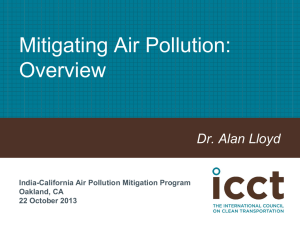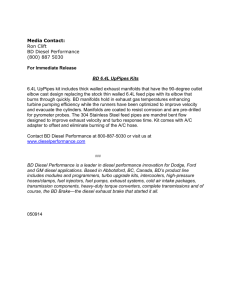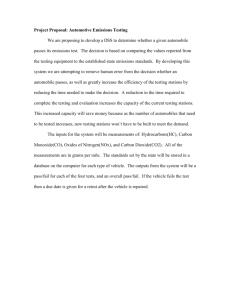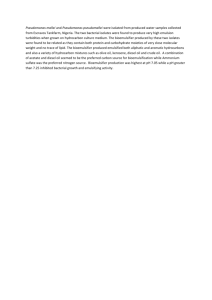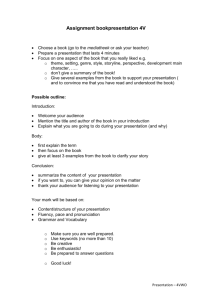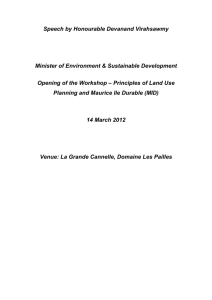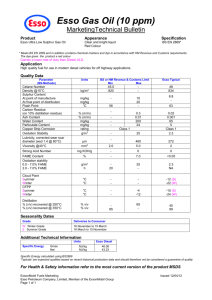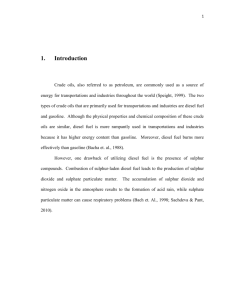10.11.22 Workshop Low Sulphur Diesel
advertisement
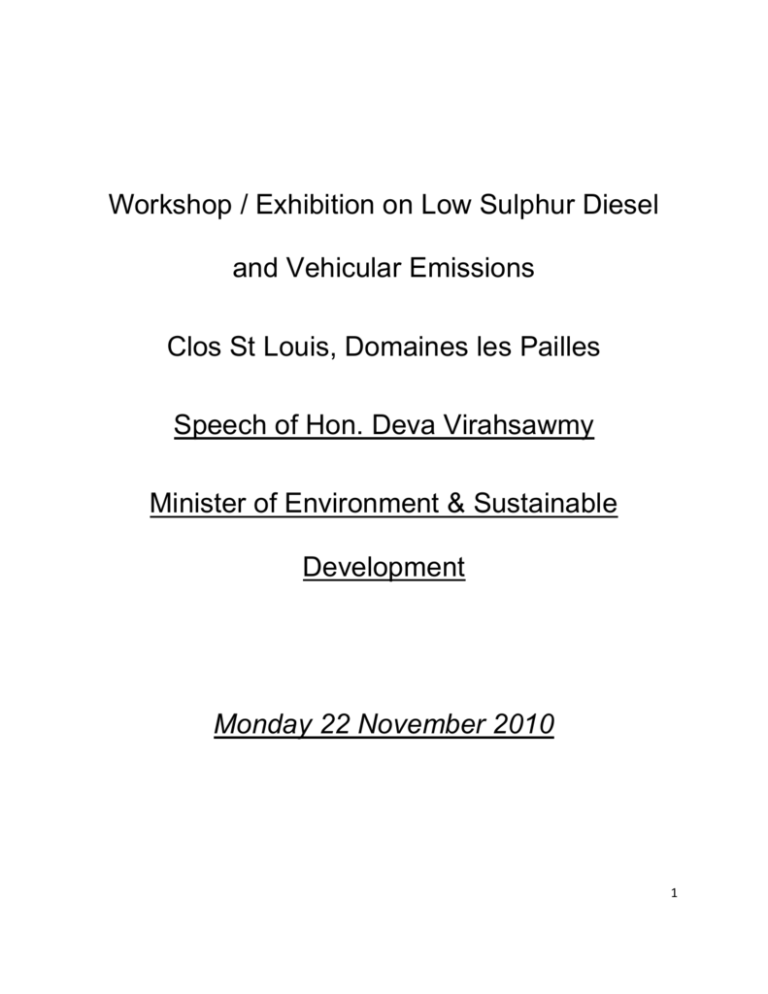
Workshop / Exhibition on Low Sulphur Diesel and Vehicular Emissions Clos St Louis, Domaines les Pailles Speech of Hon. Deva Virahsawmy Minister of Environment & Sustainable Development Monday 22 November 2010 1 Mr. Sateeaved Seebaluck, Supervising Officer, Ministry of Environment & Sustainable Development Mrs Ng, Director of Environment Mrs Jane Akumu, Programme Officer from UNEP-PCFV Mr. Stuart Rayner, from the National Association of Automobile Manufacturers of South Africa Representatives of the public and private sector, and academia, Members of the Press, Distinguished Guests, Ladies and Gentlemen. Good Morning It is a pleasure for me to be in your midst today on the occasion of this twoday workshop-cum-exhibition on low sulphur diesel and vehicular emissions, organized by my Ministry with the support of the United Nations Environment Programme Partnership for Clean Fuels and Vehicles (UNEPPCFV). It is also a pleasure to have among us Mrs Jane Akumu, Programme Officer from UNEP-PCFV and Mr. Stuart Rayner from the National Association of Automobile Manufacturers of South Africa as Resource Persons and who will be sharing with us their experience. This workshop cum exhibition is being organized at a very opportune moment as we are expecting the complete dilution of the previous stock of 2 2500-ppm (parts per million) sulphur diesel to the new 500-ppm diesel grade in our petrol pump stations within a couple of weeks. Ladies and Gentlemen, We are seriously concerned with vehicle exhaust emission as it a major source of air pollution in Mauritius, especially black smoke emissions from diesel-driven vehicles. This problem is being further aggravated with the rapid increase in the number of diesel-driven vehicles over the last decade, from some 73,000 in year 2000 to 118,000 in 2010. Recognising the fact that fuel quality is one of the factors affecting vehicle emissions, Government decided, in March 2009, to introduce diesel with a sulphur content not exceeding 500 ppm for the automotive sector within the least possible delay. In spite of several constraints being faced such as limited storage capacity and on-going stringent import contract , we have been able to receive the first consignment of the 500-ppm sulphur diesel in August 2010. Ladies and Gentlemen, The introduction of 500-ppm sulphur diesel was indeed an important milestone in Government’s efforts towards improving our ambient air quality and environment and ensuring more protection to public health through a reduction in emission of black smoke, sulphur dioxide, hydrocarbons and greenhouse gases from vehicle exhaust tailpipes. Apart from 3 environmental and health benefits, use of this diesel grade will enable our country to take advantage of the latest technological breakthrough in automobile diesel engines and of the introduction of new diesel efficiency vehicle generation. However, the introduction of the 500-ppm diesel is not the end of our goal. Now that we have the infrastructure in place, we intend to move in the near future towards the importation of 50-ppm sulphur diesel. Ladies and Gentlemen, My Ministry has the overall responsibility to coordinate environmental management and promote sustainable development in Mauritius. In this national effort towards Maurice Ile Durable, we have embarked on a number of initiatives. In line with the recommendations of the National Environmental Strategy report, my Ministry with the assistance of the European Commission has undertaken the project “Establishing an Integrated Ambient Air Quality Monitoring Framework and Developing an Air Quality Index for Mauritius.” This project will enable my Ministry to effectively execute its roles and functions as Enforcing Agency for Air Quality. Furthermore, we now have a new National Environment Policy with a view to reconciling environmental sustainability with economic and social development with the ultimate goal of providing better quality of life to the population. Our National Environmental Strategies have also been reviewed, and includes Air Quality Management which covers a whole 4 range of economically important sectors including Aviation, Power, Transport and Industry among the portfolio of environmental projects. Continual improvement of our air quality is indeed in line with the concept of Maurice Ile Durable as cherished by our Prime Minister, Dr. the Honourable, Navinchandra Ramgoolam. His vision is forward looking as we shape the sustainability path of Mauritius. Within this context, my Ministry is currently working towards the development of the Maurice Ile Durable Policy and Strategy and the development of a Legislative and institutional Framework to facilitate and enhance the implementation of the MID Policy and Strategy. My Ministry is also putting a lot of emphasis on environmental education and sensitization. You would all concur with me that public awareness is a key enabler in bringing change in mindsets. That is why we believe that it is vital to raise awareness on best practices such as regular vehicle servicing and fuel efficient driving practice. I am very happy to note that the workshop-cum-exhibition will cover the aspects of awareness raising. This workshop-cum-exhibition is just a kick-start to sensitize and inform stakeholders on how to maintain and have a well tuned diesel engine with exhaust emissions complying with current standards. My Ministry will sustain the sensitization through a media awareness campaign which would target the youth, Drivers and the public at large. 5 Ladies and Gentlemen, Vehicle emission control is a complex issue and calls for a close collaboration and synergy with all stakeholder organisations mainly the the National Transport Authority and the Mauritius Police Force as authorities responsible to enforce legislation on vehicular emissions are paramount in this quest. Within this collaborative framework, my Ministry, through the Police de L’Environnement, is providing assistance by issuing notices (PF71 Forms) under the Road Traffic Act to drivers of smoky vehicles for opacity tests at the NTA Vehicle Examination Centres. From 2001 up to October 2010, the Police de L’Environnement has issued 40,943 notices to vehicles emitting black smoke. Effective monitoring of vehicle emission also depends largely on the use of latest technology and equipment such as smoke meters, axle weigh bridge and sound level meters. In this context we are presently in the process of procuring these specialised equipments which would be placed in the custody of the Mauritius Police Force and the National Transport Authority. These equipments will enable more stringent control of vehicular emissions both on our roads and at the NTA Vehicle Examination Centres. 6 Ladies and Gentlemen, We cannot and should not ignore the most important asset that we have, which is our human resource. As Minister, I have always ensured that training is imparted to our people so that they can remain abreast of latest development in their respective fields. This workshop is yet another vivid example of our capacity building strategy which would empower the participants on the benefits of low sulphur diesel and cleaner vehicles and enable them at the end to become more productive. Let me therefore seize this opportunity to thank all the organisations and individuals who are contributing to the success of this workshop-cum-exhibition. I, now, have the pleasure to declare this two-day workshop-cum-exhibition open. Thank you 7
